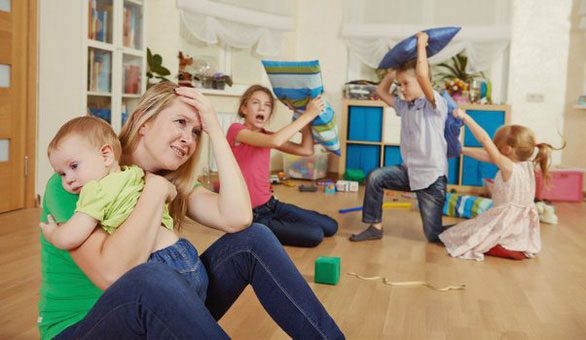According to a new study published in the U.S. National Library of Medicine, having three or more children may age parents by at least 6.2 years.
A research team from Columbia University’s Mailman School of Public Health, the Robert Butler Columbia Aging Center (USA), and Paris-Dauphine University – PSL (France) analyzed data from the Survey of Health, Ageing and Retirement in Europe (SHARE) involving thousands of individuals aged 65 and older across 20 European countries and Israel. These individuals had at least two biological children.

A large family is not always a joy – (Illustrative photo: SHUTTERSTOCK)
The results indicated that those with three or more children had poorer health and cognitive functioning later in life compared to those with only one or two children.
Dr. Eric Bonsang, an economics professor at Paris-Dauphine University and a member of the research team, stated: “The negative impact of having three or more children on cognitive function is significant, equivalent to losing 6.2 years of lifespan.”
Notably, contrary to the belief that this impact is primarily felt by women, the study found that both men and women experience accelerated “aging” after having a third child.
The exact reasons for this “aging” phenomenon remain unclear, but researchers suggest that stress and financial burdens associated with having more children accelerate the aging process.
Having additional children can impose significant financial costs on parents, reduce family income, and diminish resources for other life pleasures.
Financial worries compel parents to work harder. The fatigue and pressure from work, combined with the economic burden and the need to care for multiple children, can lead both fathers and mothers to experience stress. Over time, both physical and mental exhaustion can significantly affect cognitive functioning and brain activities.

The stress of having more children contributes to reducing parents’ relaxation time and investment in cognitive-stimulating activities – (Photo: QUORA)
This is the first study to explore the causal impact of reproduction on cognition in later life. So far, birth rates have not been given as much attention as potential predictors of cognitive outcomes in old age compared to other factors, such as education or occupation.
Early aging and cognitive decline not only affect personal lives but also have societal implications. For individuals, ensuring brain health and engaging in social activities are crucial for maintaining mental clarity at all stages of life, especially in old age.
For society, ensuring cognitive health is essential for extending working life and reducing healthcare costs for the elderly.
Another study from Boston University also found that optimistic individuals tend to live longer and healthier lives compared to pessimistic individuals, primarily because they face fewer stressful events.
According to researchers, given the significant impact of having a third child on mental health and cognition, parents should carefully consider the accompanying factors before deciding to have more children.
Countries also need to adopt new research directions, examining the potential impacts of not having children or having many children on elderly cognition. This could inform population development strategies, balance birth rates, and ensure education, health, and social welfare.


















































